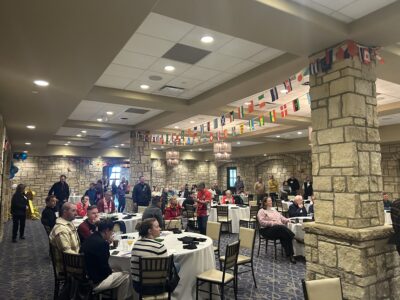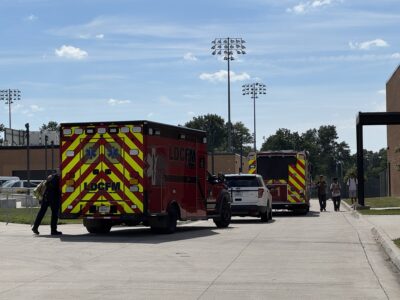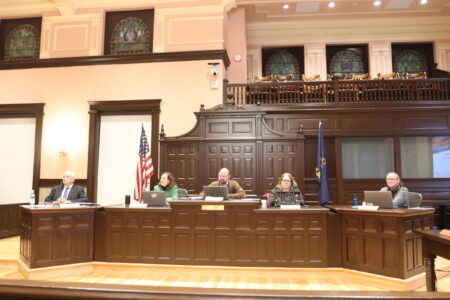Haskell University celebrates graduates after a trying semester, with speakers reminding how the community ‘will not be silenced’

photo by: Mike Yoder
Graduates participate in the Haskell Indian Nations University commencement ceremony Friday, May 9, 2025.
While speakers reflected on the resilience required of Haskell Indian Nations University students as they endured a tough semester, the main focus of Friday morning’s graduation was celebration and a reminder of the university’s fortitude and durability.
In an overflowing Coffin Sports Complex, 178 graduates crossed the stage and received their degrees.
Frank Arpan, Haskell’s president, noted that the students and faculty have been through “quite the semester.” In February, nearly 40 Haskell workers, including several instructors, were fired due to the Trump administration’s orders to cut the federal workforce, as the Journal-World reported. The university is governed by the Bureau of Indian Education, a division of the Department of Interior.

photo by: Mike Yoder
The 2025 Haskell Indian Nations University commencement ceremony was held inside Coffin Complex Friday, May 9, 2025.
The employees were eventually ordered to be hired back by a federal judge, as the Journal-World reported. Those employees were heartily cheered by the audience, as well by Arpan and students who spoke at the ceremony.
Scott Davis, the Department of Interior’s acting assistant secretary of Indian Affairs, gave a special address to the students. Davis, a member of the Standing Rock Sioux and Turtle Mountain Band of Chippewa, said that he attended Haskell as a track athlete and that he felt emotional upon returning and seeing all the “beautiful faces” who were about to graduate.
Davis spoke about the strength and resilience the students had shown in the face of the disruptions, and he described how working and “grinding” at Haskell “launches a spirit” in the students. From his current position in the Department of Interior, Davis said he was thinking about ways he could help “his relatives” of the wider Indigenous community, saying he would work to make a “better and stronger place for Haskell.”
Haskell alumna Lois Stevens, an assistant professor of First Nations Studies and the First Nations Education Doctoral Program at the University of Wisconsin-Green Bay, was the day’s commencement speaker. Stevens graduated from Haskell in 2012 — one of five siblings to attend the school — and then earned master’s and doctoral degrees from the University of Kansas. Stevens said she was thrilled to be back at Haskell, telling the crowd that in her experience of many colleges “there is no other place like Haskell.”
Stevens, who is a citizen of the Oneida Nation in Wisconsin, shared her name, Kah^tuwahna, given by her great-grandmother Maria. She said Maria had attended Haskell over 100 years ago when it was a boarding school designed to “kill the Indian, save the man” and wipe out Native heritage. She said it was powerful to be able to speak in an Indigenous language at a place “where things were stolen” when the federal government tried to make Native Americans “relics of a lost time.”
“We aren’t supposed to be here,” Stevens said. “Yet here we are.”
Stevens likened the recent cuts from the Trump administration as another “attempt to silence us again,” but the Haskell community raised their voices and people listened. In the wake of the firings, as the Journal-World reported, hundreds in the community came together to help the people impacted by the abrupt terminations and to lend support to one another. Stevens told the graduates that further attempts to erase their culture will fail.
“You will not be silenced,” Stevens said. “Your voices will only get stronger.”
Stevens noted that resilience can be a way to oversimplify the experience for many Indigenous people, but she asked the students to let “resilience be a promise of all we will continue to build.” In a place that had witnessed historic tragedy, Stevens said the graduates were the “medicine our ancestors prayed for in their darkest moments,” reminding them that in the face of this year’s disruptions and history, they belong.
“We will never be silenced. We are not going anywhere,” Stevens said.

photo by: Mike Yoder
Jana Brouse, South Dakota, left, places a gift blanket on the shoulders of her daughter, Justina RaeLeigh Grassrope, during the Haskell Indian Nations University commencement ceremony Friday, May 9, 2025.

photo by: Mike Yoder
A beaded Haskell Indian Nations University mortarboard and feathers is worn by a Haskell graduate during commencement Friday, May 9, 2025.
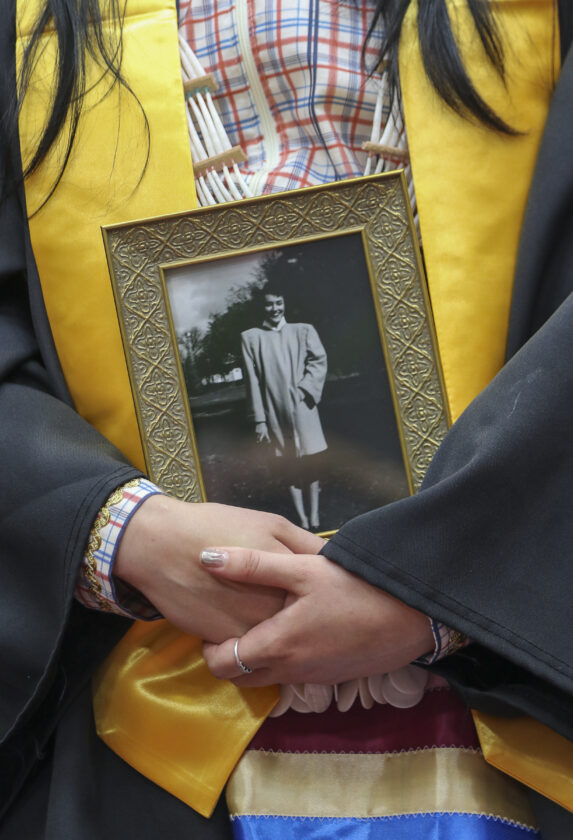
photo by: Mike Yoder
Haskell graduate Jasmine Nicole Newton holds a photograph of her grandmother, a Haskell Indian Nations University graduate in the 1940s. Newton is a fourth-generation Haskell graduate. Haskell held its 2025 commencement ceremony Friday, May 9, 2025.

photo by: Mike Yoder
Haskell graduates celebrate with family after the Haskell Indian Nations University commencement ceremony Friday, May 9, 2025.

photo by: Mike Yoder
A graduate holds her diploma during the Haskell Indian Nations University commencement ceremony Friday, May 9, 2025.

photo by: Mike Yoder
Parents and friends celebrate the graduates during the Haskell Indian Nations University commencement ceremony Friday, May 9, 2025.

photo by: Mike Yoder
Carrie Cornelius, head librarian at Haskell Indian Nations University, wears a sign for graduating students during commencement Friday, May 9, 2025.

photo by: Mike Yoder
Haskell graduates Kathryn Tso, far left, and Aysa Nicole Mae Benally, second from left, laugh during the Haskell Indian Nations University commencement ceremony Friday, May 9, 2025.
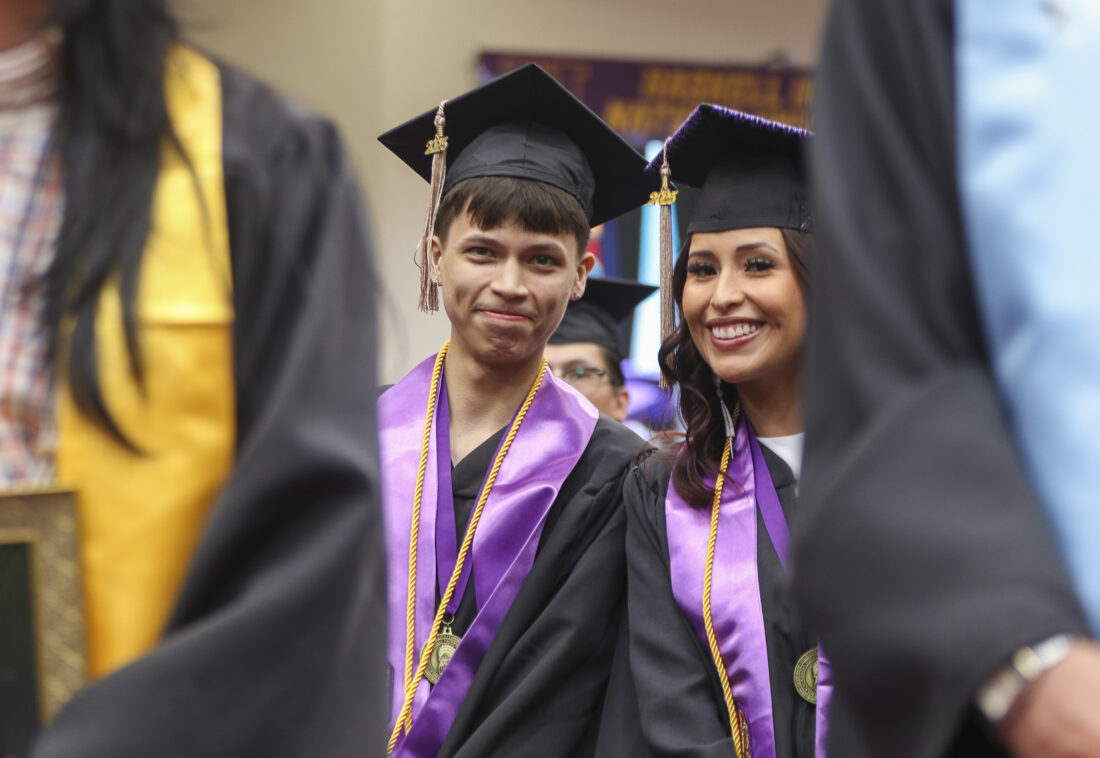
photo by: Mike Yoder
Haskell graduates participate in the Haskell Indian Nations University commencement ceremony Friday, May 9, 2025.

photo by: Mike Yoder
A contrast in footwear was evident with some Haskell graduates wearing traditional Indigenous regalia during the Haskell Indian Nations University commencement ceremony Friday, May 9, 2025.

photo by: Mike Yoder
Graduates visit during the Haskell Indian Nations University commencement ceremony Friday, May 9, 2025.

photo by: Mike Yoder
Kathryn Tso, an environmental science graduate, acknowledges the crowd as she crosses the stage during the Haskell Indian Nations University commencement ceremony Friday, May 9, 2025.
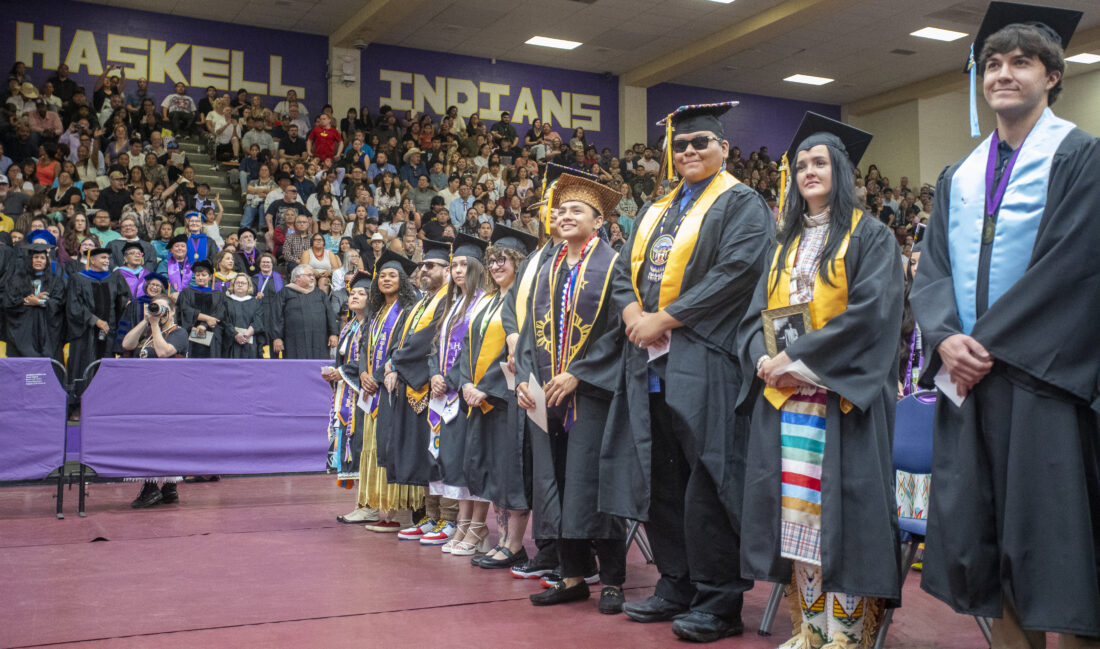
photo by: Mike Yoder
Haskell Indian Nations University graduates stand during the presentation of diplomas at Haskell Friday, May 9, 2025.


